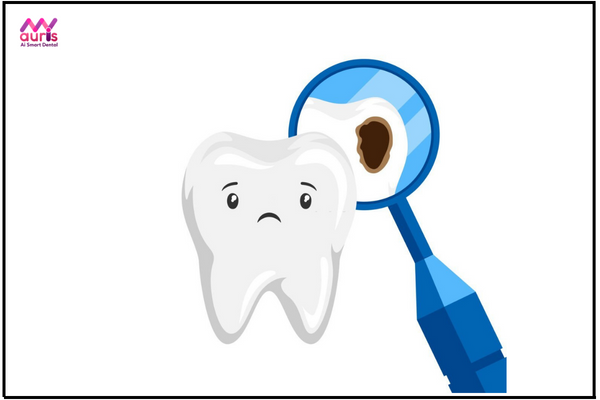Tooth decay is a condition that affects oral health, damaging tooth structure due to bacterial attack. Baby tooth decay is quite common for many reasons, so parents who thoroughly understand the issue will help their children better protect their teeth. To learn more about children’s tooth decay and related information, follow this article with My Auris.
Baby has tooth decay – What is tooth decay?
Tooth decay is the condition reflects oral health that needs care. Cavities on teeth are formed by bacteria attacking and secreting acids that erode tooth enamel. Tooth decay in children often appears on the tooth crown, with large, black cavities. Cavities cause pain, tenderness, and even lead to infection and tooth loss if not treated promptly.

Children with tooth decay photo How does it affect health?
Children’s tooth decay is very common due to many characteristics: children’s teeth are developing and perfecting, habits and preferences for eating a lot of sweets and candies, and improper oral hygiene or laziness in brushing teeth. Especially children aged 2-6 years old, whose teeth are still baby teeth, are easily attacked by bacteria in the mouth, causing tooth decay.
Here are the effects when children have tooth decay:
- affects children’s oral health. The ability to chew is reduced due to tooth sensitivity when exposed to hot, cold or spicy foods. At the same time, the force of chewing and biting food is weakened by bacteria attacking and thinning tooth enamel.
- Affects daily activities, causing discomfort because food particles get stuck in deep holes. Furthermore, when stuck in deep holes, it is difficult to clean, so it easily stays and continues to serve as food for bacteria to grow. This will also increase oral regurgitation in children. In addition, when food is stuck, children often tend to reach out to take it out, increasing bacteria into the oral cavity and damaging the gums and gums.
- The pain caused by tooth decay makes children uncomfortable and often stops eating, anorexia affects nutrition. If the tooth decay becomes more severe, the pain will become faster and more intense. When there is a sharp feeling in the tooth, it shows that the tooth decay has penetrated deep into the tooth pulp and caused inflammation.
Causes of baby havingtooth decay
There are many causes of tooth decay in children, parents should pay attention to the causes to prevent tooth decay from occurring.
The habit of eating a lot of sweets and candies
This is the main cause of tooth decay in children. Foods with high sugar content affect children’s teeth. Sweets such as cakes, candies, chocolate, ice cream, and other sugary foods are often very attractive to children. But if there is no moderation when feeding children, the risk of tooth decay is high.

In addition, giving children juice, soft drinks, milk, etc. can also cause tooth decay if not properly cleaned. Because these sugary drinks will coat teeth with sugar and dyes in the water, thereby increasing damage to tooth enamel leading to infection.
Health conditions
Some babies have certain health conditions that may also increase their risk of tooth decay. If your child has chronic allergies, he or she may have to breathe through his or her mouth, easily leading to dry mouth. Dry mouth is also one of the factors that increase the risk of children getting tooth decay.
The habit of bottle-feeding at night
Mothers should note that they should not train their children to have the habit of bottle-feeding at night. Because it is very easy to get tooth decay. The reason is that milk has a lot of sugar that can stick to the teeth for many hours, and when the baby finishes feeding, he will sleep, so this time creates favorable conditions for bacteria to attack and grow.
Lack of fluoride
Fluoride – a natural mineral present in many foods and water that also exists in toothpaste. This is a mineral that has an increased protective effect, helping to restore damage to teeth. Children who use water or toothpaste that does not contain fluoride are also at increased risk of tooth decay.
How to treat tooth decay in children?
There are many methods of treating tooth decay in young. However, parents should not hesitate or handle it at home but should take their child to the hospital to see a doctor for examination. Depending on each case and how deep the condition is, the doctor will recommend the most appropriate treatment method.
If the level of decay is light to moderate, the doctor will clean, clean and fill the tooth. In severe cases, we will carefully consider whether to undergo root canal treatment or whether to extract the tooth. The treatmentGiving a baby tooth decay must be done as soon as possible because the earlier it is easier to treat. Therefore, when you see your child say it hurts or check your child’s teeth and see spots, black cavities, bad breath, etc., you should take your child to the doctor as quickly as possible.
However, after treatment, tooth decay can still reoccur in the old tooth or another tooth if the teeth are not properly cared for and cleaned. Therefore, parents should educate their children about the importance of teeth and how to properly care for them.

Prevention of tooth decay in children
When babies start teething, parents should teach them how to properly care for and protect their teeth:
- Parents should create a habit of taking care of their children’s teeth every day right from the time baby teeth come out. Brush your teeth at least twice a day, brushing properly, for at least 2 minutes each time.
- Teach children the importance of teeth. Because if baby teeth get cavities, it can affect the baby’s permanent teeth.
- Choose for your baby a suitable, comfortable toothbrush with soft bristles to be able to brush the inside, outside as well as the teeth inside the jaw. When children brush their teeth, parents need to observe and continue until the child reaches 7 years old.
- Choose toothpaste suitable for children but must have the amount of fluoride that meets the child’s needs.
- Teach children to use diluted salt water to rinse their mouth after meals to disinfect and remove plaque on teeth.
- Get into the habit of giving children water after each meal
- Children should not eat foods high in sugar or starch because they increase the risk of tooth decay.
- Proper nutritional supplementation for children with fresh food sources, especially fruits and vegetables and foods rich in calcium that are good for teeth health.
The information in the article helps people gain more knowledge about children with tooth decay. We hope that parents will educate and find ways for their children to take better care of and protect their teeth. This helps improve permanent tooth health in the future, repelling tooth decay, weak tooth enamel, and sensitive teeth. In addition, parents should take their children for regular dental check-ups every 4-6 months.
Anh Thy





